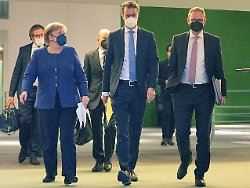Thursday, November 18, 2021
Overview of resolutions
The federal and state governments have agreed on this
2G, 2G Plus – and if the going gets tough, further measures. The federal and state governments want to take measures against the spread of the coronavirus according to uniform criteria. In the future, the hospitalization rate will be decisive.
“The pandemic is not over.” With this succinct statement begins the resolution paper, which sets down measures by the federal and state governments on which the prime ministers have agreed with the federal government. In view of a nationwide incidence of just under 337 on Thursday and alarming news from the intensive care units, the group agreed on the following points:
- New relevant value – the hospitalization rate: In the future, measures are to apply as soon as certain threshold values for the incidence of hospitalization are exceeded. What is meant is the number of hospital admissions of corona patients per 100,000 inhabitants within the past seven days.
- 2G and 2G Plus depending on the hospitalization rate: At a Hospitalization rate of over 3 should be nationwide in a federal state 2G are valid. Access to leisure events and facilities, cultural events and facilities, sporting events and exercises, restaurants and hotels will then only be granted to guests who have been vaccinated and recovered. From the hospitalization rate of 6 a test is also necessary (2G Plus). This does not apply to people who cannot be vaccinated and children under 18 years of age.
- Tougher measures in hotspot countries: From one Hospitalization rate of 9 should “consistently make use of the further possibilities of the Infection Protection Act”. For this purpose, the state parliaments should then be able to decide on contact restrictions and the closure of certain institutions (so-called state opening clause).
- Vaccinate: The federal and state governments are calling once again to get vaccinated against the corona virus. To this end, the vaccination offers are to be expanded. Children under 12 should also be offered a vaccination from the second half of December – provided that the EMA is approved by the end of next week.
- Booster vaccinations: Giving as many people booster vaccinations as quickly as possible is called a “national showdown”. As the STIKO recommends, all over 18-year-olds should receive a booster offer no earlier than five months after the first vaccination. A plan is to be drawn up by November 25 how the offers can be expanded.
- Compulsory vaccination for nurses: “All employees in hospitals and integration assistance facilities as well as in old people’s and nursing homes and in mobile care services” should, in the opinion of the federal states, be obliged to have a vaccination. The states ask the federal government to implement this.
- Daily tests when entering retirement and nursing homes: Employees and visitors must present a negative test certificate that is not older than 24 hours. This also applies to those who have been vaccinated and those who have recovered.
- 3G at work and home office: The round underlines the traffic light decision to create regulations here. Daily tests have to be carried out to see who has not been vaccinated or has recovered. Employers should offer two tests per week. In addition, the home office obligation should apply again.
- 3G in public transport and long-distance traffic: Passengers must have a test no longer than 24 hours old if they have not been vaccinated or have recovered. Since it is expected that the local public transport will be used less, the still valid reserve should be extended.
- Strict controls: The federal states promise to enforce the 2G, 2G Plus and 3G rules more consistently than before.
- Care bonus: The federal and state governments express their “deep gratitude and respect” to nursing staff. There should be another bonus, the federal government is asked to finance it.
- Corona help: The bridging allowance III Plus and the regulations on short-time work allowance are extended by three months extended until March 31, 2021.
- New Prime Minister’s Conference: The group wants to on December 9th to check whether the measures are sufficient.
